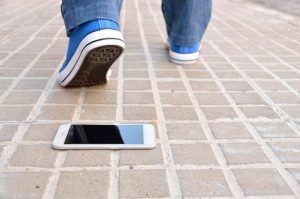Katie Reid in Nautilus:
 As a kid, I’d sometimes try to imagine what life would be like without a particular sense or part of my body, like with questions from the Would You Rather? game. Would you rather be deaf or blind? Would you rather have no legs or no arms? I’d try to erase the sound of my mom’s piano playing, the sight of the ground growing smaller as I soared on the tree swing in my backyard, or the feeling of playing basketball so hard my lungs might explode, but I just couldn’t. How could life go on without these sensations that were so tied to my idea of what it meant to be alive? I guess I’ve been feeling extra contemplative and nostalgic these days because I recently went through a pretty significant break-up…with my smartphone. My relationship with my phone was unhealthy in a lot of ways. I don’t remember exactly when I started needing to hold it during dinner or having to check Twitter before I got out of bed in the morning, but at some point I’d decided I couldn’t be without it. I’d started to notice just how often I was on my phone—and how unpleasant much of that time had become—when my daughter came along, and, just like that, time became infinitely more precious. So, I said goodbye. Now, as I reflect on the almost seven years my smartphone and I spent together, I’m starting to realize: What I had with my phone was largely physical.
As a kid, I’d sometimes try to imagine what life would be like without a particular sense or part of my body, like with questions from the Would You Rather? game. Would you rather be deaf or blind? Would you rather have no legs or no arms? I’d try to erase the sound of my mom’s piano playing, the sight of the ground growing smaller as I soared on the tree swing in my backyard, or the feeling of playing basketball so hard my lungs might explode, but I just couldn’t. How could life go on without these sensations that were so tied to my idea of what it meant to be alive? I guess I’ve been feeling extra contemplative and nostalgic these days because I recently went through a pretty significant break-up…with my smartphone. My relationship with my phone was unhealthy in a lot of ways. I don’t remember exactly when I started needing to hold it during dinner or having to check Twitter before I got out of bed in the morning, but at some point I’d decided I couldn’t be without it. I’d started to notice just how often I was on my phone—and how unpleasant much of that time had become—when my daughter came along, and, just like that, time became infinitely more precious. So, I said goodbye. Now, as I reflect on the almost seven years my smartphone and I spent together, I’m starting to realize: What I had with my phone was largely physical.
Cognitive scientists have long debated whether objects in our environment can become part of us. Philosophers Andy Clark and David Chalmers argued in their 1998 paper “The Extended Mind” that when tools help us with cognitive tasks, they become part of us—augmenting and extending our minds. Today the idea that phones specifically are extensions of ourselves is receiving a lot of recent attention. In February, in Aeon, philosopher Karina Vold explored the legal implications of applying the extended mind theory to our smartphones. If the extended mind view is correct, she writes, then smartphones would merit recognition “as a part of the essential toolkit of the mind.” Last month, in a fascinating New Yorker profile of Clark, Larissa MacFarquhar wrote that Clark thinks “we are all cyborgs, in the most natural way. Without the stimulus of the world, an infant could not learn to hear or see, and a brain develops and rewires itself in response to its environment throughout its life. Any human who uses language to think with has already incorporated an external device into his most intimate self, and the connections only proliferate from there.” For Clark, MacFarquhar continues, “The more devices and objects there are available to foster better ways of thinking, the happier he is.”
I agree with the theory, if not Clark’s sunny outlook on its implications. (More on that later.) However, when it comes to the most widely useful of modern-day tools—the smartphone—both of these recent articles overlook a key component of the extended self: embodiment. Our devices aren’t just extensions of our minds, they’re extensions of our bodies too. Clark ventures into embodiment in his 2008 book, Supersizing the Mind, in which he spends half of the first chapter discussing how bodies and senses adapt to external technology. From a monkey learning to master a robotic arm to the familiar process of “body babbling,” in which infants learn, through practice, how neural commands control certain bodily movements, Clark shows that the ability to incorporate new objects into our bodies is part of how we’re designed:
Because bodily growth and change continue, it is simply good design not to permanently lock in knowledge of any particular configuration but instead to deploy plastic neural resources and an ongoing regime of monitoring and recalibration.
I experienced that recalibration when I got my first smartphone in 2011.
More here.
